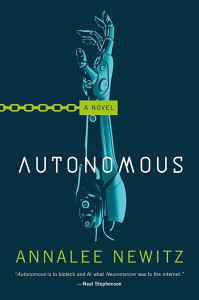 With Autonomous, Annalee Newitz has written the most subversive SF novel I’ve ever read. I’ve followed Newitz on Twitter for a couple of years but this is the first book of theirs I’ve read, so maybe all of them are like this. But I kept having to put it down and ponder the gravity of what I’d just read, which doesn’t happen so often with genre fiction.
With Autonomous, Annalee Newitz has written the most subversive SF novel I’ve ever read. I’ve followed Newitz on Twitter for a couple of years but this is the first book of theirs I’ve read, so maybe all of them are like this. But I kept having to put it down and ponder the gravity of what I’d just read, which doesn’t happen so often with genre fiction.
The book is set about 120 years from the present in a world that’s drastically different from ours. But it is definitely a world that is one possibility for the way things could turn out, starting from the present. The Earth’s physical landscape is radically altered by the climate crisis, and the human landscape is also vastly reshaped. Nation states as we know them seem to be gone, with much of the planet governed by continental and sub-continental “free trade zones.” The supreme law of the land is patent law, and mega corps jealously and zealously guard their rights with their own private armies. The biggest of the mega corps seem to be pharmas, which manufacture and genetically engineer all kinds of drugs, all of which of course are patented.
Intelligent bots of all kinds are commonplace, working side by side with humans but nearly always subordinate to them. Most bots and many humans are born with or sold into indentures, a fancy name for slavery.
Autonomous packs a lot of story into its 300 pages. We’re following the trajectories of two individuals, one human and one bot, as they arc ever closer to an intersection. The protagonist is a jaunty female submarine-piloting pirate who calls herself Jack. She’s a pharma patent pirate, reverse engineering drugs to be given or sold cheaply to people who can’t afford the real things. She’s done a short stint in prison and now is much more careful, but maybe not careful enough. Her latest batch of illicit generics is having some serious side effects on many people, leading to major incidents and multiple deaths.
Jack sets about trying to fix her mistake, but the patent police are on her trail, in the person of a newly trained bot named Paladin and her handler Eliasz. Both are bloodthirsty mercenaries who torture, maim and kill without compunction (and with legal sanction), but we see about half of the story through Paladin’s eyes (or sensors), and she’s immensely likable. There are serious questions about how much agency Paladin has, and a good case could be made that Autonomous is much more Paladin’s story than Jack’s.
The story’s plot, action, and internal monologues all revolve tightly around this concept of autonomy. And unlike a lot of sf, that theme is also closely wound with a twin theme of relationships, setting up a tension between the two. The motif of touch between individuals is another thread, and a distressingly common recurring situation of amputation (especially of hands or arms) highlights the precarity of interpersonal relationships.
With all of that going on, and a cracking good story to boot, Autonomous gives you a lot to ponder. As in real life, though a lot of the plot’s elements have been resolved by the book’s end, many of the deeper questions and issues remain. That leaves room for Newitz to continue to explore these themes should they choose to produce a sequel someday.
(Tor, 2017)
